Select Language
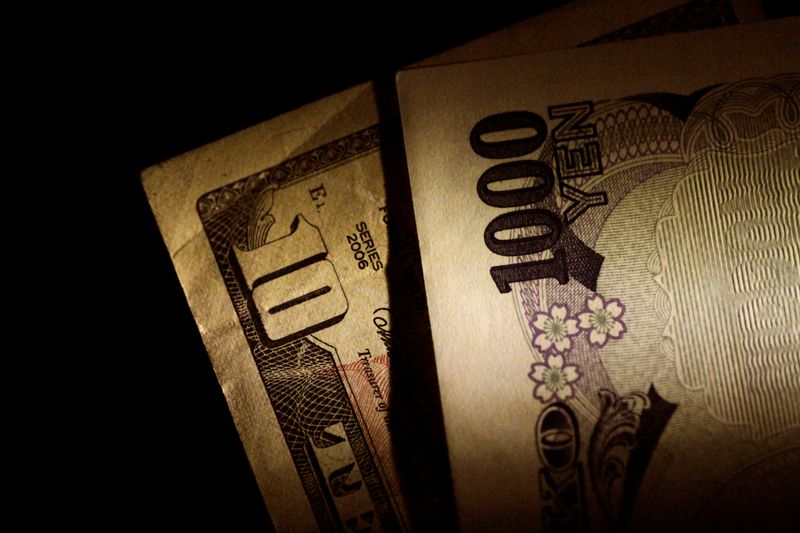
By Rae Wee
SINGAPORE (Reuters) -The yen languished near a 38-year low on Thursday and struggled on the weaker side of 160 per dollar, keeping markets on alert for any signs of intervention from Japanese authorities to prop up the currency.
In the broader market, the dollar pared some of its gains from the previous session as U.S. Treasury yields eased a touch, though the greenback held near an eight-week high against a basket of currencies.
The yen rose 0.3% to 160.33 per dollar in the Asian session, nursing some of its losses after having fallen to a low of 160.88 on Wednesday, its weakest since 1986.
The Japanese currency has fallen some 2% for the month and 12% for the year against a resilient dollar, as it continues to be hammered by stark interest rate differentials between the U.S. and Japan, which has maintained the appeal of using the yen as a funding currency for carry trades.
In a carry trade, an investor borrows in a currency with low interest rates and invests the proceeds in higher-yielding assets.
Still, the yen's latest slide past the key 160 per dollar level has kept traders nervous over possible intervention from Tokyo, after authorities spent 9.79 trillion yen ($60.94 billion) at the end of April and in early May to push the yen up 5% from its 34-year low of 160.245 then.
Analysts said while the risk of intervention has increased, Japanese authorities could be holding out for Friday's release of the U.S. personal consumption expenditures (PCE) price index before entering the market.
"Both the level of the exchange rate and pace of the depreciation are important for the Ministry of Finance (MoF) to consider intervening in FX markets," said Boris Kovacevic, global macro strategist at Convera.
"However, subdued volatility in options markets suggests that the recent leg higher has not met all criteria the MoF is looking for.
"Policymakers could wait out Friday's PCE report that is expected to show continued disinflation in the U.S. before making a final decision before the weekend."
DOLLAR STRENGTH
Sterling edged away from an over one-month low of $1.2616 hit the previous session and rose 0.13% to $1.2638, while the euro advanced 0.11% to $1.0693.
Still, the common currency was on track to lose roughly 1.4% for the month, weighed down by political turmoil in the euro zone in the lead up to France's snap election set to begin this weekend.
The dollar index dipped 0.1% to 105.92, not far from a nearly two-month high of 106.13 hit in the previous session, on the back of a rise in U.S. Treasury yields.
"I just think it's a combination of things," said Ray Attrill, head of FX strategy at National Australia Bank (OTC:NABZY), of the higher U.S. yields.
"A few people have been mentioning when (Japan) intervened back in April, May, that there was some suggestion that if the Bank of Japan was going to have to be offloading Treasuries to fund the intervention, it could have an impact.
"But I think there's maybe a bit of a ... lag effect of - Aussie yields were much higher after the CPI, and I think for once, that actually had a little bit of contagion impact to bond markets elsewhere."
An upside surprise in Australian inflation on Wednesday had caught traders off-guard and prompted markets to raise the chances of another interest rate hike this year, which in turn sent domestic yields higher.
The Australian dollar rose 0.23% to $0.6663, drawing some support from Wednesday's inflation shock, while the New Zealand dollar ticked up 0.07% to $0.6088.
Currency moves outside of the yen have been largely subdued for the most part of the week, as traders await Friday's U.S. core PCE data - the Federal Reserve's preferred measure of inflation, for further clues on the U.S. rate outlook.
Wednesday was the last day that investors could trade currencies for the quarter, given that spot foreign exchange settlement takes two business days.
Trading of U.S. stocks, however, moved to a shorter settlement cycle last month, known as T+1.
($1 = 160.6500 yen)

By Daniel Ramos
LA PAZ (Reuters) -Bolivian armed forces pulled back from the presidential palace in La Paz on Wednesday evening and a general was arrested after President Luis Arce slammed a "coup" attempt against the government and called for international support.
Earlier in the day, military units led by General Juan Jose Zuniga, recently stripped of his military command, had gathered in the central Plaza Murillo square, home to the presidential palace and Congress. A Reuters witness saw an armored vehicle ram a door of the presidential palace and soldiers rush in.
"Today the country is facing an attempted coup d'état. Today the country faces once again interests so that democracy in Bolivia is cut short," Arce said in comments from the presidential palace, with armed soldiers outside.
"The Bolivian people are summoned today. We need the Bolivian people to organize and mobilize against the coup d'état in favor of democracy."
A few hours later, a Reuters witness saw soldiers withdraw from the square and police take control of the plaza. Bolivian authorities arrested Zuniga and took him away, though their destination was unclear.
Inside the presidential palace, Arce swore in José Wilson Sanchez as the military commander, Zuniga's former role. He called for calm and order to be restored.
"I order that all personnel mobilized on the streets return to their units," Sanchez said. "We entreat that the blood of our soldiers not be spilled."
The United States said it was closely monitoring the situation and urged calm and restraint.
Tensions have been building in Bolivia ahead of general elections in 2025, with leftist ex-President Evo Morales planning to run against former ally Arce, creating a major rift in the ruling socialist party and wider political uncertainty.
Many do not want a return of Morales, who governed from 2006-2019 when he was ousted amid widespread protests and replaced by an interim conservative government. Arce then won election in 2020.
Zuniga said recently that Morales should not be able to return as president and threatened to block him if he attempted to, which led Arce to remove Zuniga from his post.
Ahead of the attack on the presidential palace, Zuniga had addressed reporters in the square and cited growing anger in the landlocked country, which has been battling an economic slump with depleted central bank reserves and pressure on the boliviano currency as gas exports have dried up.
"The three chiefs of the armed forces have come to express our dismay," Zuniga told a local TV station, calling for a new cabinet of ministers.
"Stop destroying, stop impoverishing our country, stop humiliating our army," he said in full uniform, flanked by soldiers, insisting the action being taken was supported by the public.
Zuniga told reporters later on Wednesday that Arce had on Sunday asked him to "raise something up" to boost his popularity, without offering evidence.
Interior Minister Eduardo del Castillo later said Zuniga was seeking to court popular support and that the nine people injured in the attempt proved "this was not a drill."
'STRONGEST CONDEMNATION'
Morales, head of the ruling MAS socialist party, said that his supporters would mobilize in support of democracy.
"We will not allow the armed forces to violate democracy and intimidate people," Morales said.
Bolivia's public prosecutor's office said it would launch a criminal investigation against Zuniga and others involved in the attempted coup.
Public support for Arce and Bolivia's democracy has poured in from regional leaders and beyond.
"We express the strongest condemnation of the attempted coup d'état in Bolivia. Our total support and support for President Luis Alberto Arce Catacora," Mexican President Andres Manuel Lopez Obrador said on X.
Even conservative political opponents of the government in Bolivia condemned the military action, including ex-President Jeanine Anez, who was imprisoned in 2022 amid political turmoil.
"I fully reject of the mobilization of the military in the Plaza Murillo attempting to destroy constitutional order," she wrote on X. "The MAS with Arce and Evo must be got out through the vote in 2025. We Bolivians will defend democracy."

By Tim Reid
(Reuters) - Sixteen Nobel prize-winning economists signed a letter on Tuesday warning that the U.S. and world economy will suffer if Republican presidential candidate Donald Trump wins the U.S. presidential election in November.
The jointly signed letter, first reported by Axios, says the economic agenda of U.S. President Joe Biden, a Democrat, is "vastly superior" to Trump's, the former Republican president seeking a second term.
The economists say Trump's economic plans would reignite inflation, in part because of his pledge to impose stiffer tariffs on Chinese imports, which they say will hike prices on many goods bought by U.S. consumers.
"While each of us has different views on the particulars of various economic policies, we all agree that Joe Biden's economic agenda is vastly superior to Donald Trump," the economists state in their letter.
"We believe that a second Trump term would have a negative impact on the U.S.'s economic standing in the world, and a destabilizing effect on the U.S.'s domestic economy."
The letter was signed by prominent economists including Joseph Stiglitz, who won the Nobel prize for economics in 2001, and Sir Angus Deaton, an economic Nobel laureate in 2015.
Biden and Trump are locked in a close election race. The Nov. 5 contest will be decided by voters in a handful of battleground states which are closely contested because their voting preferences can swing to Republicans or Democrats.
While headline inflation has slowed in the past two years, many U.S. consumers are still unhappy with the higher prices they have to pay for food, gas and other goods, according to public opinion polls.
Trump has pledged to impose tariffs on foreign imports, and up to at least 60% on Chinese goods coming into the U.S., a cost the economists say will be passed on to U.S. consumers in the form of price hikes.
"Many Americans are concerned about inflation, which has come down remarkably fast. There is rightly a worry that Donald Trump will reignite this inflation, with his fiscally irresponsible budgets," the letter states.
The Trump campaign did not immediately respond to a request for comment. James Singer, a Biden campaign spokesperson, called Trump's economic agenda dangerous.
The U.S. economy will be a major theme in the first presidential debate between Biden and Trump on Thursday. Trump blames Biden for high prices and inflation, while Biden claims Trump's trade policies, including tariffs, will raise inflation.
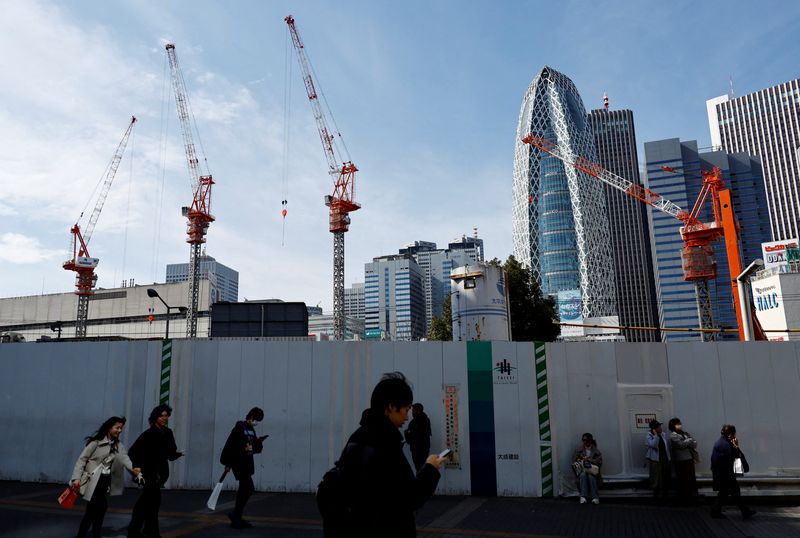
By Leika Kihara
TOKYO (Reuters) - A rare unscheduled revision to Japan's first-quarter gross domestic product (GDP) may lead to a sharp downgrade, possibly affecting the central bank's growth forecasts and the timing of its next interest rate hike, some analysts say.
The government said on Tuesday it will revise GDP figures for January-March to reflect corrections made in construction orders data, and announce the findings on July 1.
Given the big downward revision to the construction orders data, the revised January-March GDP figures are likely to show the economy contracted more than expected, some analysts say.
Yoshiki Shinke, senior executive economist at Dai-ichi Life Research Institute, expects the revision to show Japan's economy shrank an annualised 2.7% in the first quarter, much bigger than the current estimate of a 1.8% contraction.
The revision is likely to push down Japan's economic growth for the fiscal year that ended in March to 1.0% from 1.2%, and may lead to a downgrade in the current fiscal year's growth projections including for the Bank of Japan, he said.
"What's worrying is that the revision could affect monetary policy," by forcing the BOJ to trim its growth projections in fresh quarterly forecasts due at its next meeting on July 30-31.
Many economists expect the central bank to hike rates from current levels near zero sometime this year, with some betting on the chance of action at the July meeting.
"It could make it somewhat difficult for the BOJ to justify raising interest rates if it were to sharply downgrade its fiscal 2024 forecast," Shinke said.
The BOJ currently projects the economy to expand 0.8% in fiscal 2024. It has signaled readiness to raise interest rates if the economy moves in line with its forecast, and heightens the chance of inflation durably hitting its 2% target.
Japan's economy shrank an annualised 1.8% in the first quarter on weak consumption and exports, data released on June 10 showed, after a 0.4% increase in the previous quarter. The July 1 revision may also lead to downgrades in GDP figures for the third and fourth quarters of last year, analysts say.

By Stella Qiu and Wayne Cole
SYDNEY (Reuters) - Australian consumer inflation accelerated to a six-month high in May, while a key measure of core prices rose for a fourth month, figures that caught traders off-guard and prompted markets to raise the chances of another interest rate hike this year.
The Australian dollar climbed 0.4% to $0.6677 and the three-year bond futures tumbled 14 ticks to 95.97, their lowest level in three weeks.
Markets moved to imply a 50% chance of a quarter-point hike from the Reserve Bank of Australia by September, up from 12% before the data, with a move likely in August depending on the outcome of the full second-quarter CPI report.
Futures also priced out any chance of a cut in the 4.35% cash rate this year, and had only 17 basis points of easing implied by the end of 2025 compared to 44 basis points early in the day..
Data from the Australian Bureau of Statistics on Wednesday showed its monthly consumer price index (CPI) rose at an annual pace of 4.0% in May, up from 3.6% in April and well above market forecasts of 3.8%.
The CPI dipped 0.1% in May from April.
A closely watched measure of core inflation, the trimmed mean, climbed to an annual 4.4%, also its highest level in six months and up from 4.1%.
"Australia could be one of the very few developed markets to raise rates," said Russel Chesler, VanEck Head of Investments & Capital Markets.
"Forget ‘higher for longer’ – we may end up being the ‘highest for the longest’."
With inflation still running above its target band of 2-3%, the RBA has warned it is alert to upside risks. It has held interest rates steady at a 12-year high of 4.35% for five straight meetings.
The central bank will have the luxury of waiting for the quarterly report due at the end of July to decide on its next policy move. But hot readings for April and May suggest the second quarter inflation data could be as strong or stronger than the first quarter report, putting pressure on the RBA to hike in August.
Tapas Strickland, head of market economics at NAB, noted that travel costs in May did not fall as much as analysts were expecting and service prices for telecom and insurance were high.
Indeed, when volatile items and holiday travel were excluded, the CPI dipped to 4.0%, from 4.1%.
"If that quarterly inflation report does print say 1% q/q or a bit higher, then I think it's going to be very hard for the RBA to be on hold," said Strickland. "We're not there in terms of calling (a rate hike), but that risk is clearly growing."
The report showed electricity prices jumped by an annual rate of 6.5%, picking up from April's 4.2% rise, due to the unwinding of government rebates, although they are set to ease from the third quarter as new cost of living relief from the federal and state governments kicks in.
Rent surged 7.4% while insurance costs jumped 14%.
The May report, which provided an update on more services in the second quarter of the year, showed prices for haircuts, restaurant meals and takeaway food were up 5.5%, 4.2% and 4.3% annually.
"We’re still of the view that it’s more time not more hikes that’s needed to quash inflation. But we’re getting a little less steadfast in that conviction," said Harry Murphy Cruise, an economist at Moody’s Analytics.
"An August hike now can’t be ruled out."
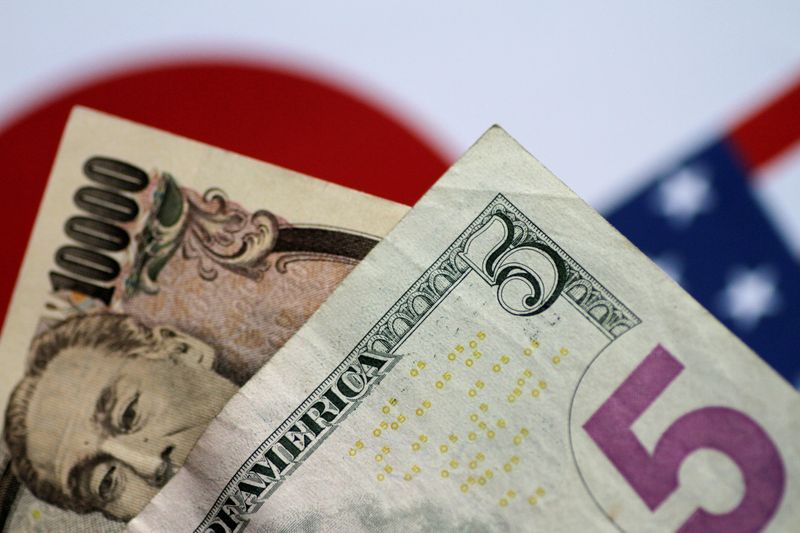
By Tom Westbrook
SINGAPORE (Reuters) -The dollar was firm on Wednesday and trading on the precipice of the 160 yen barrier as investors turned cautious and counted down to the release of U.S. price data at the end of the week.
A jump in Australian inflation to a six-month high sent the Aussie dollar up 0.3% to $0.6667 in otherwise subdued markets as traders started to price a 30% risk of a Reserve Bank of Australia (RBA) rate hike as soon as August.
"The RBA's next board meeting on August 6th is now 'live,'" said Tony Sycamore at brokerage IG Markets.
A similar surprise in Canadian inflation had sent the Canadian dollar briefly spiking to a three-week high.
Elsewhere the euro was steady at $1.0714 in Asia and at 159.78 per dollar, the yen's level has markets on alert for intervention since that is only a whisker shy of where Japanese authorities likely stepped in to buy yen in April.
Markets are banking that Friday's U.S. data shows annual growth in the Federal Reserve's favoured core personal consumption expenditure index slowed to 2.6% in May, the lowest in more than three years and opening the way to rate cuts.
Policymakers, however, continue to signal they are in no rush, with Fed Governors Lisa Cook and particularly Michelle Bowman stressing that decisions will depend on data.
"Inflation in the U.S. remains elevated, and I still see a number of upside inflation risks that affect my outlook," Bowman said.
The Australian dollar dipped 0.1% to $0.6640 and the New Zealand dollar similarly slipped to $0.6115, with small moves reflecting thin trade.
Citi said this week that its etraders found interbank FX volumes some 40% lower than thirty-day averages.
Sterling was steady at $1.268, while bitcoin has recovered somewhat from a dip below $60,000 this week to trade at $61,668.
Along with the yen, China's yuan is also getting squeezed by the dollar's stubborn strength. China has seemed to signal some tolerance for a cheaper currency by gradually weakening the midpoint of the yuan's daily trading range on the dollar.
The yuan has hugged the low side of its band for months and was last at 7.2884 per dollar in offshore trade.
"The yen moves more, and yuan moves are more controlled, but they seldom move in opposite directions," said Societe Generale (OTC:SCGLY) strategist Kit Juckes.
"If USD/JPY does break through 160 in the coming days, preventing further yuan weakness would be very difficult indeed."
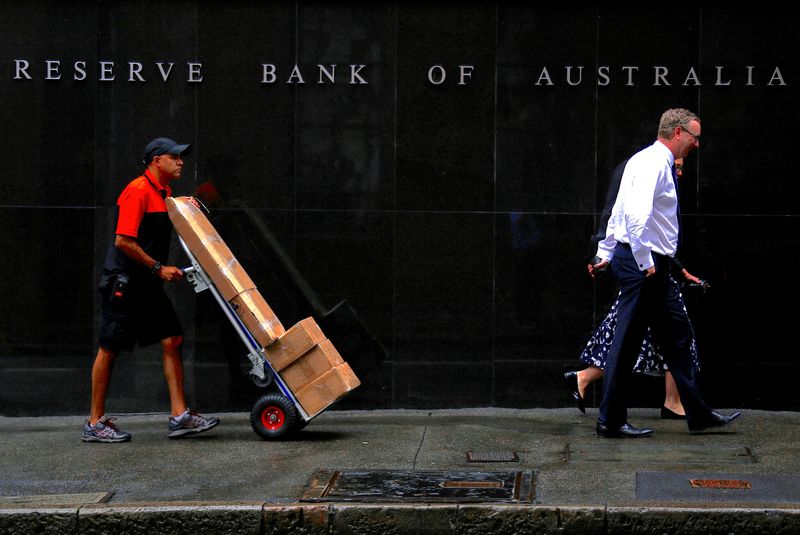
SYDNEY (Reuters) - Australia's central bank said on Wednesday that monetary policy was restrictive with the current cash rate causing financial pain for many households, but it could not rule out further tightening if necessary to tame inflation.
In a speech on the banking industry in Melbourne, Reserve Bank of Australia (RBA) Assistant Governor Christopher Kent said interest rates of 4.35% were contributing to slower growth of demand and lower inflation.
"We know that many are feeling a painful squeeze on their finances because of higher interest rates," said Kent, noting mortgage payment has already increased to a record 10% of household disposable income.
Kent said rates were clearly above all estimates of the neutral rate - that which neither stimulates nor retards economic growth.
The RBA has raised interest rates by a whopping 425 basis points since May 2022, but has held steady for five straight meetings with inflation running at 3.6%, well above its target band of 2-3%.
RBA Governor Michele Bullock earlier this month told reporters that the restrictive policy is one reason that the policymakers were reluctant to raise rates further at its June policy meeting.
Markets see only a modest chance of a rate cut until April next year, and just 43 basis points of easing has been priced in by the end of 2025.
Kent reiterated the central bank was in no rush to ease.
"While recent economic data have been mixed, they have reinforced the need to remain vigilant to upside risks to inflation," he reiterated.

(Reuters) - Uncertainty looms over the U.S. auto industry, fueled by expectations that the presidential elections in November will reshape the economy, affect interest rates or influence inflation levels, a report from Cox Automotive showed on Tuesday.
Cox forecast that new-vehicles sales volume in the first half of 2024 will rise by 2.9% year-over-year and held its full-year forecast steady at 15.7 million.
WHY IT'S IMPORTANT
Consumers in the U.S. have been reluctant to make big-ticket purchases like vehicles due to inflationary pressures. Shoppers may continue to hold back due to economic uncertainty stemming from the presidential election, the report says.
KEY QUOTES
"If shoppers believe interest rates will be lower in the future, or that the economy will be improving – or worsening – post-election, they are more likely to stay on the sidelines, waiting for the dust to settle," said Vanessa Ton, senior manager at Cox Automotive.
"There is a view from consumers now that if they wait, they're going to get a better price," Charlie Chesbrough, senior economist for Cox Automotive, said in a media briefing on Tuesday.
BY THE NUMBERSBoth shoppers and dealers believe that inflation is the top concern, with 74% of consumers and 81% of dealers believing the next election will influence it.
However, auto dealers are divided on the impact of the election on vehicle sales, with about 38% expecting sales to worsen, and 31% each who expect sales will either improve or remain the same.
WHAT'S NEXT
About 41% consumers believe that vehicle prices will rise due to the election, while 33% believe it will have no impact on prices, according to the report.

MUMBAI/BENGALURU (Reuters) -India's worsening water shortage, triggered by high consumption amid rapid economic growth and frequent natural disasters, can negatively impact the South Asian nation's sovereign credit strength, Moody's (NYSE:MCO) Ratings said on Tuesday.
Millions of Indians face water shortages every summer when water demand rises in farms, offices and homes against a limited supply, but a prolonged heatwave this year has worsened the shortfall, including in Delhi and the southern tech hub of Bengaluru.
"This is detrimental to the credit health of the sovereign, as well as sectors that heavily consume water, such as coal power generators and steel-makers," Moody's Ratings said in a note.
"In the long term, investment in water management can mitigate risks from potential water shortages," it added.
India's average annual water availability per capita is likely to drop to 1,367 cubic meters by 2031 from an already-low 1,486 cubic meters in 2021, according to the Ministry of Water Resources.
A level below 1,700 cubic meters indicates water stress, with 1,000 cubic meters being the threshold for water scarcity, according to the ministry.
"Decreases in water supply can disrupt agricultural production and industrial operations, resulting in inflation in food prices and declines in income for affected businesses and communities, while sparking social unrest," Moody's said.
This, in turn, can exacerbate volatility in India's growth, it warned.
Increases in the frequency of water shortage, severity or durations of extreme climate events stemming from climate change will exacerbate the situation because India heavily relies on monsoon rainfall for water supply, the global agency said.
Industrialisation and urbanisation will intensify competition for water among businesses and residents, it added.
The sustainable finance market in India can provide companies and regional governments with a critical avenue to raise funds, it said. Moody's currently has a Baa3 rating on India with a stable outlook.
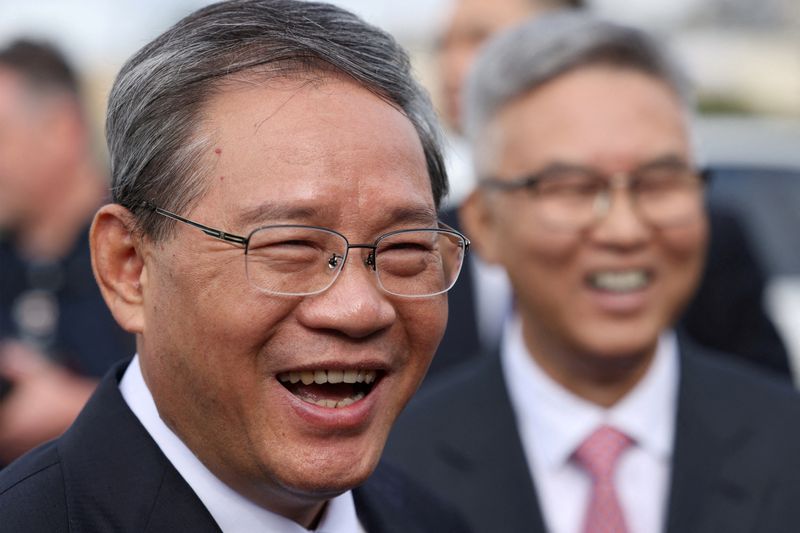
By Ellen Zhang and Joe Cash
DALIAN, China (Reuters) -China's Premier Li Qiang used his address at a World Economic Forum meeting in Dalian to hit back at accusations from the U.S. and EU that Chinese firms benefit from unfair subsidies and are poised to flood their markets with cheap green technologies.
Li's comments come as China and the European Union prepare to host technical talks on the planned imposition of tariffs on Chinese-made electric vehicles (EVs) imported into the 27-strong bloc and after the United States unveiled steep tariff hikes on an array of Chinese imports, including EV batteries, in May.
"China's production of advanced electric vehicles, lithium-ion batteries and photovoltaic products, etcetera, first met our domestic demand, but also enrich global supply," Li said in opening remarks in the northeastern Chinese city on Tuesday.
"The rapid rise of China's new industries is rooted in our own unique comparative advantages," Li added.
Brussels' trade policy has turned increasingly protective and aligned with that of Washington over concerns China's production-focused development model could see it flooded with cheap goods as Chinese firms look to step up exports amid weak domestic demand.
Beijing has warned Brussels it risks opening up a new front in the West's trade war with Beijing - which began with Washington's initial import tariffs in 2018 - and opened an anti-dumping probe into EU pork imports following the EU's tariff decision.
"The continuous emergence of economies of scale can effectively dilute enterprises' innovation costs... which is the real source of the strong competitiveness of China's new industries," Li said.
China maintains it simply decided to invest in green technologies earlier, and that the West's actions are unjustified.
"China's really made headway into producing these cars at low cost... so it is a lesson for us to try to get our act together and be better at it," said Benoit Boulet, professor of electrical and computer engineering at McGill University, on the summit's sidelines.
"It's seen as a threat at the very beginning, but then eventually Chinese cars will come to North America."
China and Chinese analysts have consistently rejected accusations it has an over-capacity problem or that its firms benefit from unfair subsidies, asserting that as the $18.6 trillion economy recovers, supply will better meet demand.
Li told delegates "the rapid growth of new industries and new driving forces has strongly supported and sustained the healthy development of China's economy."
"Since the beginning of this year, China's economy has maintained an upward trend... and is expected to continue to improve steadily over the second quarter," Li said.
"We are confident and capable of achieving the full-year economic growth target of around 5%," he added.

